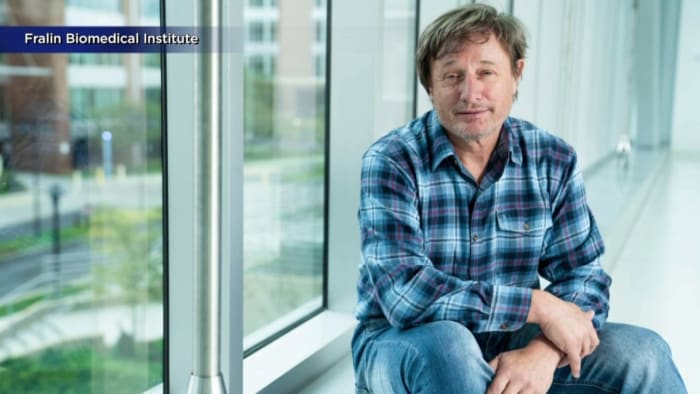
ROANOKE, Va. – Groundbreaking work is happening at the Fralin Biomedical Institute in Roanoke under the leadership of Dr. Robert Gourdie.
“Americans may not be familiar with this particular ball, but it’s a cricket ball,” Gourdie explained as he held a ball about the size of a baseball in his hand.
A cricket ball, unlike a baseball, has stitching that circles the middle, like the earth’s equator.
Gourdie credits cricket for launching his career in science, explaining that he was too preoccupied with sports while in high school in New Zealand to give much energy to academic pursuits.
“I was obsessed with cricket and in fact, I was obsessed with making this ball as unhittable as possible,” he said.
In the lab – the same need for experimentation in cricket eventually led him down many paths of discovery.
Gourdie pointed to the computer screen scattered with tiny green dots scattered across it as if someone had thrown a handful of dust at it. He sees the dots as “tiny baggies.”
Called exosomes, they come from unpasteurized milk. They’re about the size of a virus, and they may have long-reaching effects for treatment of people with a myriad of illnesses and diseases.
In the nearby lab, a machine separates the exosomes from the milk.
Gourdie and his team didn’t discover exosomes, but they have figured out how to fill them with medicine and use them to deliver drugs where they are needed in the body, without things like stomach enzymes damaging the medicine itself.
“So, milk has basically designed a very beautiful drug delivery system. And so, we’re hijacking what mother nature did to put her own drugs into a to deliver to these tissues as they go,” Gourdie said.
He believes this delivery system may one day be the best answer to delivering medications for cancer, heart disease, COVID-19 and more.
“I think we are talking all those things,” he said.
And, Gourdie said the exosomes seem to know where the problem is in the body, seeking out damaged tissue, say in the heart or even the brain.
While the research appears promising, it’s only half the battle. The concept can’t help patients unless it makes it from the lab to the marketplace, which with clinical trials can take a decade or more – not to mention hundreds of millions of dollars.
Gourdie and his team are also entrepreneurs.
“We do the traditional academic stuff. We do rigorous research. We assemble that research into scientific papers that have been peer-reviewed and published. But we also take it a step further if we have an invention that looks like it’s going to be medically useful. We’ll make certain we have a patent in place before we publish. And then, if it’s really interesting, then we’ll take the next step and form a startup company,” Gourdie said.
In this case, the company is called the Tiny Cargo Company – since the exosomes carry medication or the “cargo.”
Spencer Marsh a Ph.D. post-doctoral fellow working with Gourdie spends equal time researching and seeking funding to keep the Tiny Cargo Company going.
“The biggest grant that we’ve gotten at this point was a national science foundation phase one small business grant, which was about a quarter million dollars, and that is really kind of stepped us up on what we can accomplish,” Marsh said. He also explained that there had been numerous other smaller funding sources.
The ultimate step would be to attract investors, who would risk their millions to see if exosomes really will deliver.
This is just one of many projects the Institute is exploring under Gourdie’s leadership.
In March, Gourdie received the Outstanding Investigator Award from the National Institutes of Health for 6.4 million dollars, to give his team, increased freedom to carry out inventive research concepts that aren’t tethered to specific, finite projects.
“You’re basically told us to get on with it. Bring some more useful stuff back in from Mother Nature and just keep doing what you’re doing. We trust you,” Gourdie said.
Gourdie will receive the Entrepreneur of the Year award at the Annual Junior Achievement Gala, which is slated to be held at the Hotel Roanoke on Nov. 16.
Copyright 2022 by WSLS 10 – All rights reserved.